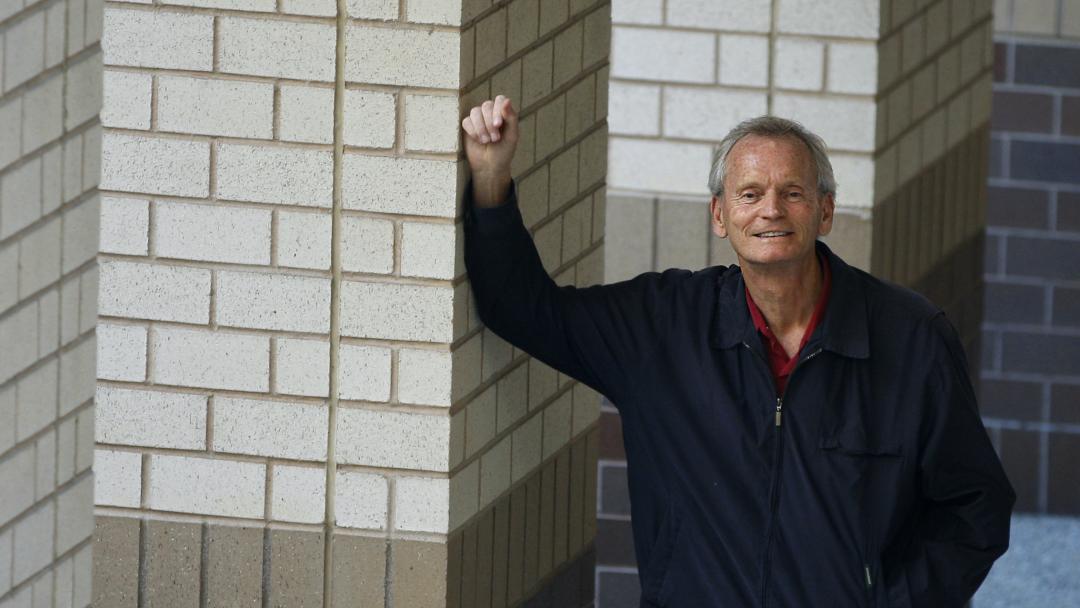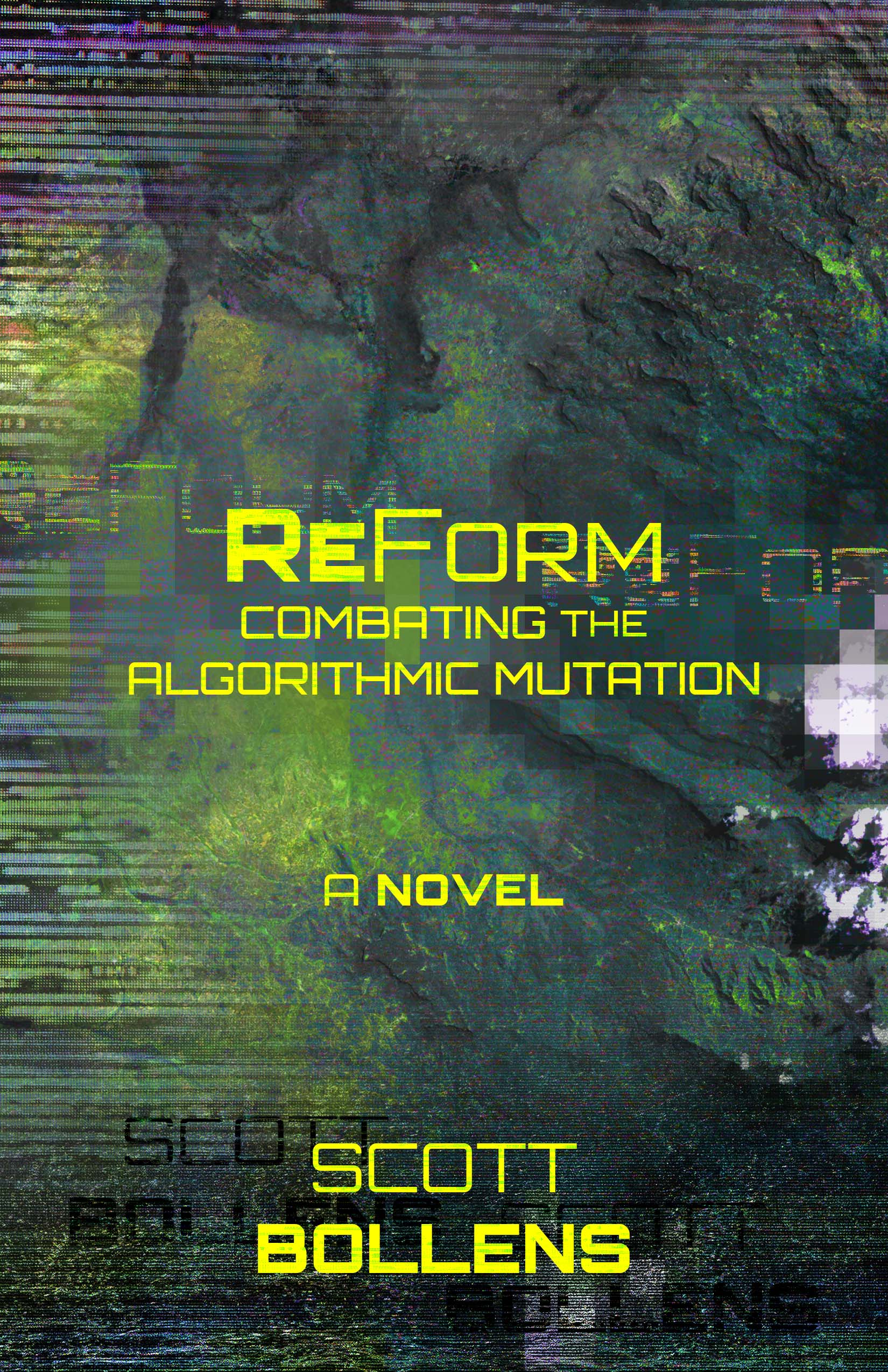
Professor Scott Bollens’ second novel, ReForm: Combating the Algorithmic Mutation, which is set in a dystopian future. Photo by Karen Tapia
Today’s events inform new futuristic sci-fi novel
Take major issues of the day such as social media penetration, political polarization, and urban division, jump ahead 25-35 years in the future and what do you have? The ripe setting for Scott Bollens’ new novel ReForm: Combating the Algorithmic Mutation.
 The author of six nonfiction books that you would more likely expect from a UC Irvine professor of urban planning and public policy, Bollens has now written his second cyberpunk novel with, ReForm, the sequel to 2021’s ReStart: Stories of the Cairn Age.
The author of six nonfiction books that you would more likely expect from a UC Irvine professor of urban planning and public policy, Bollens has now written his second cyberpunk novel with, ReForm, the sequel to 2021’s ReStart: Stories of the Cairn Age.
While both works are set in a dystopian future, their seeds were planted in our current world, having percolated in Bollens’ brain over 30 years spent researching and traveling to regions overtaken by war, civil unrest and authoritarianism. Over that time, the social scientist found his nonfiction writing (“You know, very structured, somewhat dense, footnoted stuff”) evolving.
“As I wrote more about these war-torn places, I found my writing opening up more and more, away from that strict structure of academic writing into more open narrative writing,” Bollens says. “It was still nonfiction, but a few years back, I was kind of morphing into a different sort of writer, and I thought, ‘this is the time to try something new and creative.’ ”
The first result of this was ReStart, which is set in a post-chaos 2052, when re-programmed investigator Jared Rohde seeks to uncover the possibilities for independent human thinking after decades of humankind’s addiction to a dominating computer network called interconnect. “An intriguing and unsettling read, ReStart portrays a viable future given our current social and political dynamics,” wrote one reviewer. “Bollens’ use of a faux-anthropological lens will grab you until the end.”
Spoiler alert: ReForm picks up with the 2058 re-emergence of interconnect, which had ceased operating due to users’ destructive computer addictions, including the one that sent Rohde to treatment for split-brain seizures. As he discovers after being sprung from a mental institution, the supposedly more benign interconnect is not what it seems. A different reviewer writes that ReForm “captivates with its intricate storyline, well-crafted characters, and a thought-provoking exploration of the perils of algorithmic control in society.”
“It has a lot to do with how far algorithmic input can go in influencing our beliefs and our actions in this world,” Bollens says of the subjects of his novels. “I started writing them during the Trump administration and the QAnon phenomenon, and I thought, ‘How can people believe this?’ Well, they firmly believe it because it’s the input they’re getting all the time. It’s the echo chambers where they’re only hearing their own reality. What happens to humans and our ability to independently think when we’re flooded by all of this? The ignorance we have today, the pseudo realities, they seem to be socially and politically constructed, and it seems to be more and more a construction by these good old, curated algorithms that penetrate us all the time.”
Though fiction, ReStart and ReForm are grounded in Bollens’ real-life escapades.
“I’ve interviewed more than 350 individuals in nine different war-torn cities, so I used a lot of those experiences,” he says. “I changed names, I brought out personalities. The real world helped me with the fictional world building.”
So did being an avid hiker.
“I have hiked more than 800 miles along the Pacific Crest Trail, and I used a lot of that in ReForm, portraying this wilderness track that Jared and these resistors undertook intentionally to cleanse their heads, to get away from manipulated society.”
Bollens hopes readers are more than just titillated by his latest work and see the reality behind the fiction.
“Futurist fiction is capable of illuminating fundamental realities of today,” he says. “It sensationalizes them and maybe exaggerates them, but the basic, fundamental dilemmas portrayed in ReForm and the prequel are those that we’re dealing with today. A lot of times when I tell people the ideas in this book, their most common response is, ‘Wow. It sounds like today.’ If there’s no break in what’s happening, and if this just intensifies through the years and decades, is this what’s going to happen? That’s what I want a reader to contemplate. I sure hope these fictional works are not predictive.”
Bollens is cagey about whether his novels will be part of a trilogy.
“Who knows what will happen in the years to come?” he says. “When I did the first novel, I thought there was a way to create a second novel out of it. I didn’t really see that path clearly for novel three, but actually the more I think about it, I think there may be a way. Maybe it will be called ReVersion.”
For now, the professor is just along for the ride.
“I always thought it would be interesting to try fiction, but I never thought I would get to it,” he concedes. “But then came Trump and QAnon and the pandemic, and they kind of stimulated me. I was quite angry, and I used that anger to bust out in creative paths.”
Professor Bollens hosts a launch party for ReForm: Combating the Algorithmic Mutation on Sunday, June 4, 4-5:15 p.m. at North Bluff Clubhouse, 2490 Vista del Oro, Newport Beach. Go here for more about the event and a link to RSVP.
— Matt Coker